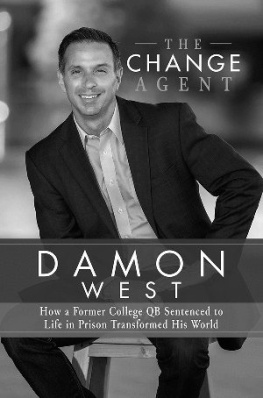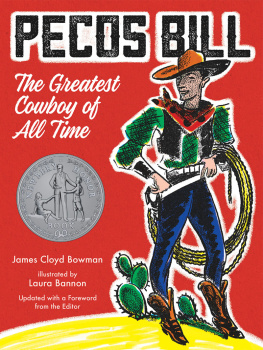This edition is published by BORODINO BOOKS www.pp-publishing.com
To join our mailing list for new titles or for issues with our books borodinobooks@gmail.com
Or on Facebook
Text originally published in 1943 under the same title.
Borodino Books 2018, all rights reserved. No part of this publication may be reproduced, stored in a retrieval system or transmitted by any means, electrical, mechanical or otherwise without the written permission of the copyright holder.
Publishers Note
Although in most cases we have retained the Authors original spelling and grammar to authentically reproduce the work of the Author and the original intent of such material, some additional notes and clarifications have been added for the modern readers benefit.
We have also made every effort to include all maps and illustrations of the original edition the limitations of formatting do not allow of including larger maps, we will upload as many of these maps as possible.
ROY BEAN:
LAW WEST OF THE PECOS
BY
C. L. SONNICHSEN
Men have forgotten how full clear and deep
The Yellowstone moved on the gravel and grass grew
When the land lay waiting for her westward people!
A. MacLeish, EMPIRE BUILDERS.
ILLUSTRATIONS
Judge Bean as he usually looked
Roy Bean and his family
The Law West of the Pecos
Judge Bean on old Bayo
Morning mood at the Jersey Lily
The only known picture of the old saloon, destroyed by fire in 1899
The Jersey Lily falling to pieces after Roy Beans death
Fitzsimmons-Maher fight; the bridge over the Rio Grande
The Ring and a few of the spectators
Mrs. Langtry
MEET JUDGE BEAN
FIFTY YEARS AGO most of the male passengers on the Southern Pacific westbound from San Antonio to El Paso used to perk up a little as they approached the high bridge over the Pecos River. They knew that twenty miles beyond was a small oasis named Langtry where they would have fifteen or twenty minutes to stretch their legs, buy a drink, and pass the time of day with Judge Roy Bean.
Long before the coaches jarred to a halt in the shadow of the Langtry water tank, the greenhorns in the smoking car would have full information, some of it true, about the Law West of the Pecos, as Roy Bean called himself. With their curiosity already on edge they would take in the handful of adobe buildings which was Langtry, the little station and the big water tank, and finally the small frame shack twenty steps north of the tracks with a covered porch in front and signs plastered over it: THE JERSEY LILLY. JUDGE ROY BEAN NOTARY PUBLIC. LAW WEST OF THE PECOS.
Someone would say, There he is! And there he would bea sturdy, gray-bearded figure with a Mexican sombrero on his head and a portly stomach mushrooming out over his belt, waiting on his porch for the swirl of business and excitement which always came at train time. You could see at a glance that he was as rough as a sand burr and tough as a boiled owl, but you realized also that he was a genuine character with plenty of salt in him.
If you came back more than once and really got to know the old man, you found that he was a curious mixture of qualities. First you noticed that he was almost innocent of book learning, that he was egotistical and opinionated, that he regarded cheating you as good clean fun, and that he drank too much and washed too little. Once you got used to these drawbacks, however, you found that you had to like and even admire him. He was really a tough old rooster and had been a godsend to the ranger force when in 1882 they got him his commission as justice of the peace to help clean up the railroad construction camps. At the same time he concealed under his horny hide a heart which was not without soft spots. Children and animals liked him, and that is supposed to prove something. Then too, he was often generous in his own high-handed, tyrannical way. The poor Mexicans in the neighborhood would not have known what to do without his benevolent bullying. Finally, he had a color and flavor, authentic and attractive, which made people take an interest in him and forget about his profanity, unscrupulousness, and dirt.
The best people, of course, have always been puzzled by a phenomenon like Roy Bean. Some of them still ask bitterly why such an old rapscallion should get so much attention when better men have lived and died unknown. The boys in the smoking car who piled off the train at Langtry and hot-footed it for the Jersey Lily never asked that question. They knew deep down among their instincts that Roy Bean, with all his faults and shortcomingsperhaps even because of themwas made out of the stuff of America. So they drank with him, played poker with him, laughed when he gypped them, and told epic tales about him which still go marching on.
They told about the time he held an inquest over a dead body on which he had found forty dollars and a pistol. He fined the corpse forty dollars for carrying concealed weapons.
They told about the Irishman who was brought into court for killing a Chinaman. Roy turned him loose, remarking that he had gone through his law book and found that it was homicide to kill a human being. But, he said, Ill be damned if I can find any place where it says its against the law to kill a Chinaman.
They told about his habit of divorcing couples he had married, though he had no legal right to do so, explaining that he only aimed to rectify his errors.
They told about his long-range platonic affair with Lily Langtry, the actress.
They told about the time he pulled off a heavyweight championship prize fight in his own back yard.
They told fifty yarns to show that he was too cagy to be taken in, too smart to be bluffed, and too tough to be damaged, and most of the stories were at least half true.
What they could not tell about, because they were not aware of it, was the real, deep-seated reason for Roy Beans notoriety. They were not aware that the American people were examining old Roy as a candidate for hero worship-finding out if he could stand up to Davy Crockett and Alike Fink and Paul Bunyan; experimenting to see whether good folk stories could be made up about him; testing his quality to see if it was true frontier American.
This may seem like an eccentric and over-subtle way of looking at the old man, but there are arguments to justify it. No one doubts that older races than ours have been better able than we to evolve Robin Hoods, Siegfrieds, Rolands, and Arthurs to embody the national ideals. It is almost as plain to anyone who tries to understand our country that America has missed these symbolshas yearned for themhas even gone out and kidnapped some likely prospects and made heroes of them by main force. Jesse James is one example. Billy the Kid is another. With the help of Hollywood we have constructed shrines for such drunken old tarts as Calamity Jane and have burned incense before such homicidal exhibitionists as Wild Bill Hickok. It looks as if the American People have gone shopping for heroes and come home with whatever they could find.







